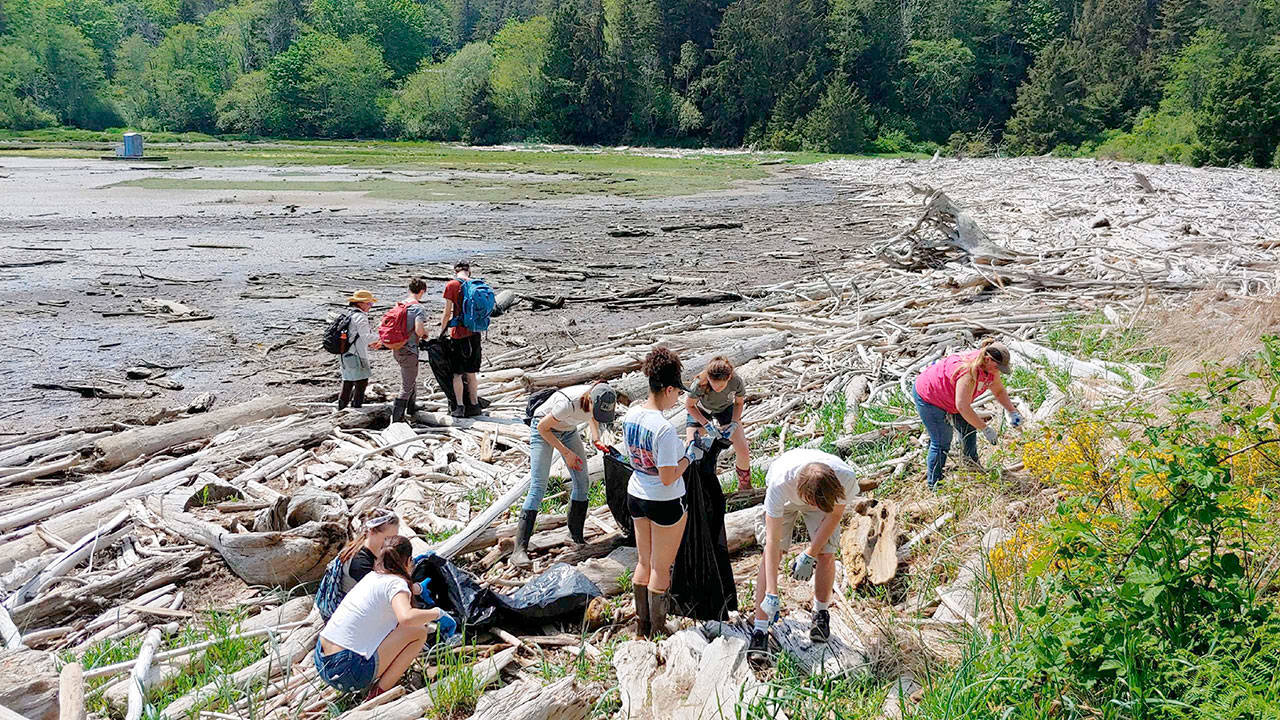QUILCENE — Students from Chimacum, Port Townsend and North Kingston high schools cleaned plastic debris from the shores of Tarboo-Dabob Bay in an inaugural event, “Dabob Day.”
About a dozen students and their adult helpers sweated in the heat May 11 as they worked together in the cleanup co-sponsored by Rock Point Oyster Company and Northwest Watershed Institute (NWI), according to a press release.
The groups decided to partner on the event after both coincidentally scheduled spring cleanups in Tarboo-Dabob last year.
Rock Point Oyster Company is a family-owned business that grows Pacific oysters, Manilla clams, Savory clams, and Pacific Oyster seed.
The firm has been in operation on Tarboo Bay at the north end of Dabob Bay since the 1940s.
Rock Point personnel work year-round to keep the bay clean of aqua culture farming debris such as harvest bags, said Jude Rubin, stewardship and public outreach director of NWI, in the release.
The group found a variety of plastic and rope debris from throughout Hood Canal, she said.
“Most of it is not ours [Rock Point’s]; it washes into Dabob Bay from Hood Canal,” said Lisa Long, operations manager for Rock Point.
“The Army Corp of Engineers requires shellfish farms to log and photograph the debris, and track it monthly. Our crews are out here regularly patrolling for trash, but it is really great to have help from these students,” she added.
She told students that flat, black discs are “mussel discs,” which can be returned to Penn Cove Mussel Company for reuse.
The remainder — colored plastic nets, bottles and white crumbling foam pieces that students untangled from driftwood — were photographed and taken to a landfill by Rock Point.
NWI is a nonprofit conservation group that protects and restores natural areas the Tarboo-Dabob Bay watershed for salmon and wildlife.
Since 2002, NWI has worked with other organizations and with landowners to protect and restore over 4,000 acres from the headwaters of Tarboo Creek to Dabob Bay.
“Tarboo-Dabob Bay is one of the least developed bays in Puget Sound,” Rubin said. “It is important to remove plastic refuse before it kills marine life and gets broken into micro-particles and becomes part of the marine food chain,” she said.
“This area is a priority in the state for its natural habitats, high quality shellfish growing areas, and the diversity fish and wildlife species that live here.”
The state Department of Natural Resources manages the Dabob Bay Natural Area, which includes most of the protected shorelines surrounding the bay.
DNR says that the area includes mature coastal forests, streams, feeder bluffs, forage fish spawning areas, eelgrass beds, native Olympia oyster beds, nearshore tidelands and mudflats utilized by juvenile salmon and shorebirds, and open marine waters utilized by salmon, marine birds, harbor seals and orcas.
The teen clean-up group included four students from NWI’s Youth Environmental Stewards Program (YES!) who earn high school credit by working as leaders on local environmental projects, Rubin said.
Additional students from Chimacum were completing six of the 55 service hours they need to graduate from high school. The event concluded with a circle of thanks for the sponsors, and a barbecue provided by Rock Point Oyster Company.

